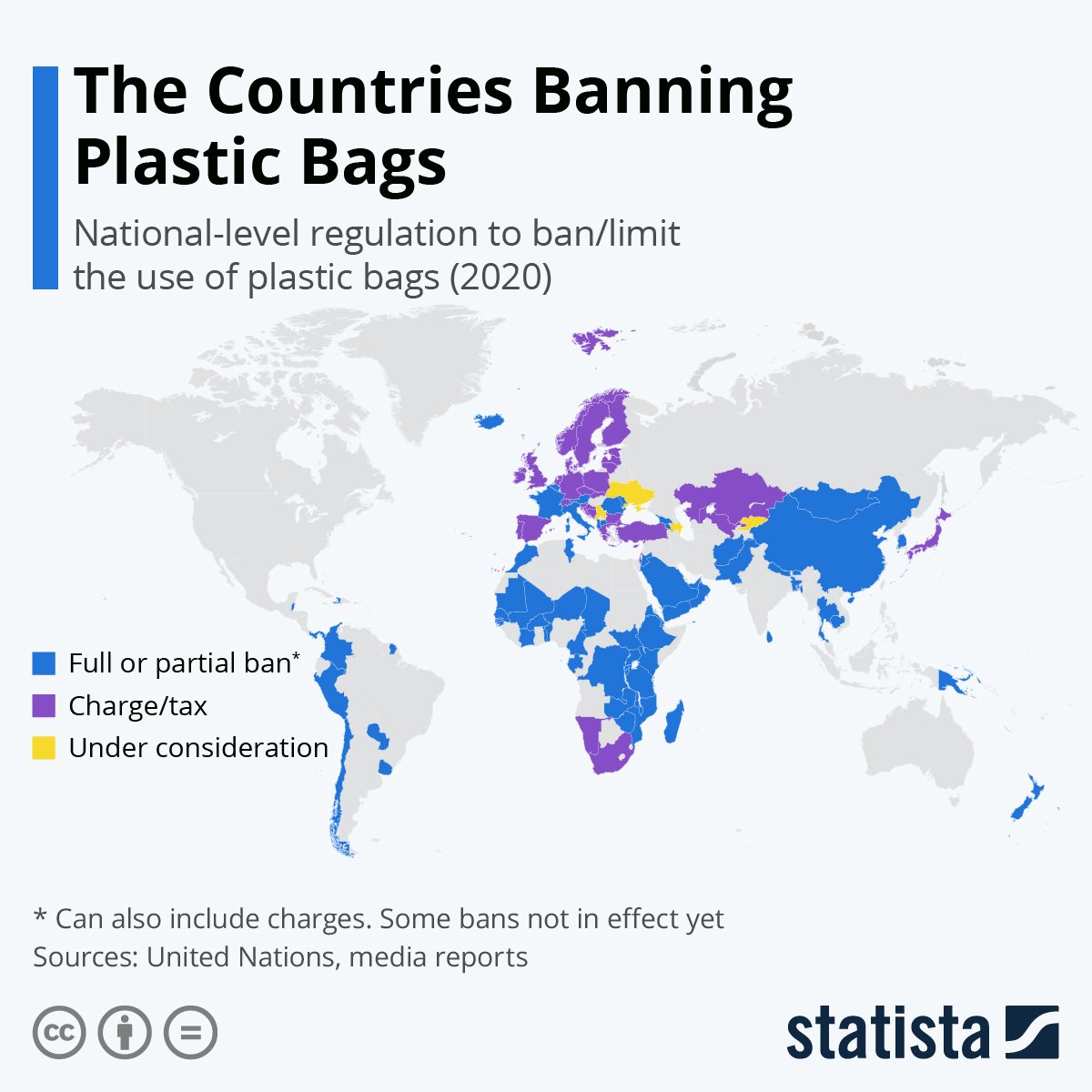
Despite recycling efforts, 79% of plastic waste lands up in landfills, oceans, rivers and on sidewalks – with the rest being burned if not successfully recycled. Therefore, the impact of plastic waste on the global environment is devastating where plastic bags – and straws to a large extent – have been hailed as the holy grail for environmental damage
It is for this reason that a number of countries across the globe – 69 in total – have implemented a full or limited ban on plastic bags, to mitigate the vast environmental impact and improve waste management standards. What is concerning though is that this number is merely 35% of the world’s countries – not vaguely enough to make an everlasting impact.
Interestingly, although high income countries generate more plastic per person, it is these very countries that are not lagging behind in plastic bag waste management. In fact, on the reverse, our very own continent – Africa - is at the forefront of plastic bag regulation where 31 bans on the continent have been made in Sub-Saharan Africa, one of the globes poorest regions!
With 34 out of 54 countries in the African region placing a ban of sorts on plastic bags and 16 of these totally banning the use of plastic bags, we certainly have something special when it comes to plastic bag management. While the first plastic bag ban didn’t start on the continent, our ability to learn, adapt and implement solutions rapidly – our resilience as a nation – has placed us ahead of the globe.
Let’s take a look at some of the leading prohibitions that have put Africa on the map when it comes to plastic bag management.
Rwanda is arguably the most progressive in the fight against plastic pollution, being the world’s first plastic-free country as a result of their ban on non-biodegradable plastics. Second to this, is Tanzania’s 2019 restriction of plastic at their borders and airports – any visitor coming into the country is not permitted to enter with any form of single use plastic. This was another world first.
Then, looking into East Africa, Kenya, a country that used 100 million plastic bags a year, replaced all plastic bags with those made from a thicker, synthetic fabric – placing what is one of the world’s most punitive penalties on non-conformity to regulation on the industry. Both corporate manufactures, retailers, and business, as well as consumers, found with plastic bags, face fines of up to $38,000 or four years in prison.
Similarly, in South Africa, we have taken a hard stance on this matter too with a R100k fine or 10 year’s imprisonment for breaking any of the plastic bag related laws.
South Africa’s stance was to prohibit plastic bags with a wall thickness of less than 8- micrometers to ensure reuse and effective recycling as well as placing a levy on plastic bag purchasing by consumers in store.
These levies not only reduced consumption at supermarket chains alone by 90% but, according to SARS, revenue brought in by the sale of these bans increased by R59 million to R300 million in the 2018/19 tax year. In addition, last year, the Department of Environmental Affairs announced that they are relooking policies to address plastic shopping bags more aggressively and focus legislation around single-use plastics. Locally, many shopping malls adopted a ‘no plastic shopping bags’ policy early last year, with the likes of Woolworths banning all plastic (using only material bags) and Liberty Two Degrees (L2D) introducing the introduction of recycling drop-off booths across their properties.
Full list of bans per African country, click here.
So why is Africa, with some of the poorest regions across the globe, getting it right?
There are a few key elements to a successful plastic bag ban but ultimately, it is centered around the key premise and approach to a circular economy – reuse, reduce, recycle, repurpose at each and every level. Africa has take a sound approach to the following areas:
- Regulation – placing prohibitions in place and enforcing these at all levels as well as putting stringent non-compliance fines and consequences in place.
- Innovative waste management & creating alternative off-takes – with a strong waste management industry on the continent, new innovations in plastic bag reuse, recycling and disposal have played a strong role in creating a take-off for this waste stream, giving corporates a solid business case.
- Quick action & accountability – knowing that 90% of our plastic waste is inadequately disposed of meant that African countries had to act quickly or face an even larger waste crisis.
These are just a few reasons why Africa is leading but ultimately it is the collective effort of government, manufacturers, waste management business and end consumers in changing behaviours and operating towards the greater good of our environment. Sure, we have a long way to go still but the reality is that we are on the right path – despite numerous challenges on the continent. This is something to be proud of!
Sign up for priority access to the latest in waste stream innovations and legislation changes.




SUBMIT YOUR COMMENT